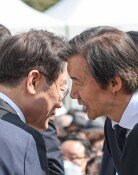Politicians lame excuse: people
Recently, many Korean politicians speak a mantra of "people." After suffering crushing defeat in the by-election on April 29, main opposition New Politics Alliance for Democracy (NPAD) Chairman Moon Jae-in said, (The result is) Not a defeat of people. Ruling Saenuri Chairman Kim Moo-sung who agreed on the retrogressive reform bill of the public pension system said, It holds great significance to reach a consensus through nationwide compromise. Moons saying is full of contradiction. If the election result is not a defeat of people who voted for the NPAD, does it mean that the majority, or the rest of voters who did not cast ballots for the opposition party, is defeated? Kims comment is an exaggeration. No ordinary citizen has ever participated in the "nationwide compromise" for the public servant pension reform. These are political rhetoric, which most of people would not agree with.
In the past, the word "people" was regarded as a legacy from the age of dictatorship and its usage was avoided. It was true especially among progressive groups. They preferred to use "citizens" rather than "people." Group of people with common sense is called as "civil society," which is differentiated from people or the nation. Labor groups pledged allegiance to the labor instead of the nation. The Korean term to refer to elementary school, which has "people" in it, was removed as the term was originated from the Japanese colonial era.
However, the word "people" appears in records from the ancient Korean dynasty Goryeo. In the Annals of the Joseon Dynasty, "people" or "the public" are mentioned 231 times in total. The term is used 33 times, the largest number, in the records for King Sejong. Examples are "Peoples wish was fulfilled," and "sin against people." The person who shed new light on the neglected word "people" in the politics was NPAD lawmaker Ahn Cheol-soo, who always said If people want. Ahn announced his candidacy for president at the "Report session for people" and created a "People fund" to raise the election campaign fund.
Some groups rejection against "people" may come from negative recognition on the establishment of the Republic of Korea. Preamble of the NPADs political principle policy describes Koreas history, which jumps from the interim government to the 1960 April Revolution. As there is no description on the nations establishment in 1948, it would be hard for them to talk about people. It is not clear whether the "people" that Moon and Ahn claim is the entire people of Korea or the people on their side, but it is a progress that they mention the word frequently. People know well whether politicians rhetoric of people is a mere trick or not. Only politicians believe people have fallen for it.
chansik@donga.com







